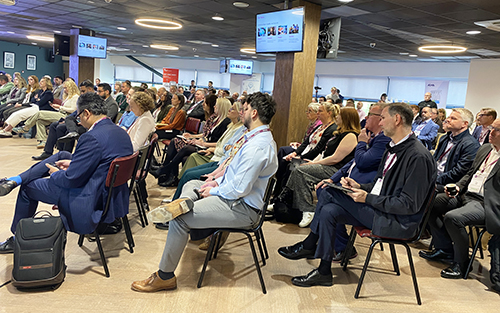Celebrating achievements and looking to the future at Pharma Manufacturing 2025

The agenda focused on a range of topics, including the importance of skills and apprenticeships as facilitators for a career in the industry; the increasing role of sustainability and ethics; growing modalities including biopharmaceuticals, nuclear medicine, peptides and antibody-drug conjugates (ADCs); and exciting new technologies and therapies.
Presenting at the conference were three keynote speakers: Senior Director at Bristol Myers Squibb, Clare Rawlinson-Malone; TIRO’s Founder and CEO, Charlotte Blant; and Kit Erlebach, Senior Director of Engineering and EHS at FUJIFILM Diosynth Biotechnologies.
The first presentation of the day, “Building for the Future: Sustainability, Innovation and Inclusion”, showcased Bristol Myers Squibb’s sustainability practices through its Moreton site, which includes a building with the 4th best EPC in England and Wales – better than carbon net-zero – and a new building to replace an existing one, designed to Building Research Establishment Environmental Assessment Methodology (BREEAM) Outstanding principles, and despite being a 70% larger footprint, will be 60% more energy efficient. Other initiatives include prioritising the local supply chain and responsible material sourcing, improving innovation and efficiency of lab operations, and improving operating performance and costs.
The company’s inclusive culture and environment for disability and neurodiversity was also highlighted, with initiatives including People and Business Resources Groups, Mental Health Ambassadors and Menopause Advocates helping to rank Bristol Myers Squibb on several Best Workplaces lists for 2024, including for women, for development and in BioPharma.
The second keynote, “Shaping the Future of Science and Technology through Apprenticeships”, examined the changing scale and types of roles with new skills needed for competitivenesswithin UK life sciences, with skills being key to sector growth, attracting investment, and long-term sustainability. The changing skills landscape was also discussed, with the launch of Skills England, functional skills reform (with more flexibility for over-19s), a greater input from Industry on training priorities, the potential changing of the Apprenticeship and Skills Levy and the introduction of Lifelong Learning Entitlement (LLE) all contributing to the value of apprenticeships as a route to a career in the sector.
The role of leadership in talent development was also identified as a key area, with senior buy-in vital to programme success, alongside aligning apprenticeships to strategic goals, and building future-ready, resilient teams.
Supporting the importance of apprenticeships as a route to employment, Keira Chippendale, a second-year Laboratory Science (Microbiology) Degree Apprentice at GSK, then spoke about how the process has benefitted her, namely gaining theoretical knowledge from her degree specific to microbiology alongside biology and workplace skills, four years of practical experience upon completion of her apprenticeship, networking opportunities within the sector, development opportunities (both personally and professionally), and leadership opportunities within the apprentice community.
It was also noted that the company benefits from this arrangement, by tailoring training to the skills and knowledge employees at the company need, encouraging cross-department collaboration, being able to upskill existing employees with higher level apprenticeships, and sustaining the future of the company with early talent.
The keynotes concluded with “Seeds of KojoX™ Fueled by Innovation from the Northeast”, which looked at FUJIFILM Diosynth Biotechnologies’ driver of patients’ access to medicine, facilitated by KojoX™’s operating philosophy with a modular approach across sites, scales, modalities, and product life cycle. Three key functional areas have been incorporated into this approach: processes, to create customer-specific recipes for fast tech transfers; equipment, with standardised and flexible equipment configurations and fit-for-purpose modules providing fast, low-risk and well-known solutions; and procedures, which ensure high quality Current Good Practises process execution grounded in experience and expertise.
Demonstrating the role of the North as a major player and performing a key role in the KojoX™ programme is the newly-opened microbial fermentation manufacturing facility in Billingham, Stockton-on-Tees, which triples existing microbial production throughput with the flexibility to accommodate new partner projects and provide supply chain resilience.
Bionow’s Exec Director of Business Development, Stella James, commented: “The North has so much to offer as a pharma manufacturing leader, and showcasing its strengths is really important. We had some fantastic discussions about the future of the industry: how we can become more agile, more sustainable, and how we can attract and keep the best talent at the start of their careers to build an even stronger reputation. I’m really excited to see how the sector steps up to these challenges in the years ahead.”
Pharma Manufacturing 2025 is kindly supported by Bouygues Energies & Services, Enterprise Ireland, Tees Valley Combined Authority, AstraZeneca, Bristol Myers Squibb, CSL Seqirus, Elanco, FUJIFILM Diosynth Biotechnologies, GSK, Pharmaron, Quotient Sciences and Sterling Pharma Solutions.





















